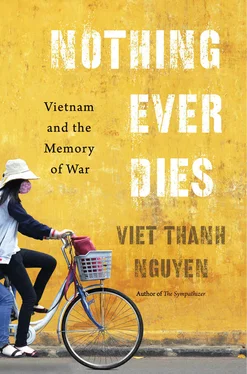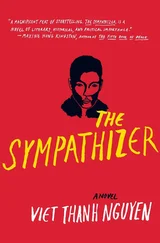What Jacques Derrida and Thich Nhat Hanh ask for, what Immanuel Kant and Martin Luther King Jr. call for, is both simple and difficult, the need to challenge the story about war and violence that so many find easy to accept. This story says that we must resign ourselves to the necessity and even nobility of war. By now war and violence are certainly a part of human identity, but identity is not natural. It can change, if we tell another kind of story and seize the means of production to circulate such a story. This story foresees a just rather than unjust forgetting, pivoting on just memory and pure forgiveness. As philosopher Charles Griswold says, “resentment is a story-telling passion,” which can be addressed through another kind of storytelling driven by forgiveness, “which requires changes in resentment’s tale.” 20Griswold, like Thich Nhat Hanh, argues that “unchecked, resentment consumes everything and everyone, including its possessor.” 21Forgiving others and letting go of resentment is an act both for others and for oneself. As Avishai Margalit says, “the decision to forgive makes one stop brooding on the past wrong, stop telling it to other people.” 22Only through forgiveness of the pure kind, extended to others and ourselves, can we actually have a just forgetting and a hope for a new kind of story where we do not constantly turn to the unjust past.
This is why storytelling specifically and art in general inhabit such an important place in this book. Storytelling allows us to tell a different story about war and its relationship to our identity. In this way, storytelling changes how we remember and forget war. The moving documentary The Betrayal ( Nerakhoon ) makes explicit how storytelling addresses betrayal and resentment. Betrayal happens at least twice in this film about a Laotian family whose father fought with the royalists and the Americans during the war. First, the Americans betrayed their Laotian allies and abandoned them to the communists. The father is sent to reeducation and his family become refugees, forced to flee to a ghetto of New York. Second, the father betrays his family when, after being released from reeducation, he finds another wife. The dual betrayals nearly destroy his first wife and children emotionally, sending them into poverty and tearing apart the family. But the eldest son, Thavisouk Phrasavath, is befriended by a young filmmaker, Ellen Kuras, and together they film the family’s story. The ending of the story is not exactly happy. After Laotian gang members murder Thavisouk’s half-brother, the son of his father and his other wife — the killing one of the war’s long-term repercussions, as Lao turn against Lao with violence — Thavisouk and his father begin a fragile reconciliation. The father acknowledges his culpability in the war, when his job was to call for American bombings. “Indeed, I regret what I have done,” the father says. “I collaborated with the Americans to bomb my own country to save it. I was part of great destruction of my country with foreigners. Indescribable destruction.” Thavisouk gets married, becomes a father, and returns to visit Laos, where he reunites tearfully with two sisters left behind—“the heaviest sorrow” for his mother — but who he cannot take with him to America. “I run between what I remember and what is forgotten, searching for the story of our people whose truth has not been told,” says Thavisouk. “As we move further from the Laos of our past, we are travelers moving in and out of dreams and nightmares. What happens to people in our land, a place we call home?”
The Betrayal ( Nerakhoon ) does not heal all the wounds inflicted on the family because of the war, but the story gestures toward just memory and toward forgiveness between family members. Just as importantly, The Betrayal ( Nerakhoon ) refuses the lure of the Hollywood spectacular or the vanity of auteurship. Instead, it is filmed over decades, a long and patient collaboration. The relationship between Phrasavath and Kuras requires trust and giving, which, lest we forget, is a part of forgiving. The film and its makers work actively to prevent the betrayal of memory, and this film is their gift to those who have seen it. Each time I encounter a meaningful work of art, I feel like I have received an unexpected gift, something to cherish. While storytelling and art are not the only ways we can give and receive gifts, they are one form of the ultimate gift, the one that comes without expectation of reciprocity. This idea of gift giving prevails among the spiritual and religious, especially those we perceive to be martyrs who have given their lives, from Jesus Christ to Thich Quang Duc to Martin Luther King Jr. But gifts can be secular as well, and small, and this book has explored a myriad of such small gifts, each one a step toward just memory and just forgetting.
At least in English, the meaning of “to forgive” once included giving or granting. In contemporary meanings of forgiving, the idea of giving lingers, when “to forgive” means to give up and cease to harbor resentment or wrath. Implicit in this definition is the idea of surrendering, not as defeat but as a kind of victory over war in that one refuses to fight further. “To forgive” is also to pardon an offense, to give up a claim to requital, to abandon one’s claim against a debtor, or to forgive a debt. 23These definitions of giving and forgiving include not only the personal, emotional, and spiritual meanings of such acts, but have material and economic implications as well. One can forgive a debt, but in giving, one can also accrue a debt. The recipient may feel the need to return the favor, or may understand that accepting the gift is a form of submission. The gift can then be mired in the expectation of exchange or reciprocity.
Going back to the white man’s burden, when the West assumes the burden of the Rest, it expects indebtedness, gratitude, and obligation from those to whom it gives the gift of civilization. To forgive that debt, as the West occasionally does, is not to forget that debt. Debt is premised on economic exchange, which in a capitalist system is based on unjust forgetting. 24As Marx argued, the commodity we love so much — the thing —depends on our forgetting the human beings who worked to create it. So it is that the inhuman thing becomes more real to us than the human worker. This is why the West often forgets the Rest, while loving the things that the Rest makes.
For Ricoeur, the way out of this inhuman cycle of giving and indebtedness is to give without expecting reciprocity. Citing Luke 6:32–35, Ricoeur says, “you must love your enemies and do good; and lend without expecting any return.” The Christian gift of love and forgiveness serves as a model for the personal act of just forgetting, where one lets go of the past, of resentment, of hatred without the expectation of any profit other than that one’s enemies will return one’s love. 25Forgiveness is also at the heart of the Buddhist practice offered by Thich Nhat Hanh and, intriguingly, in the secular, artistic work offered by some war veterans. They visit their former enemy’s land or commune with those enemies through their writing, as is the case with American writers such as John Balaban ( Remembering Heaven’s Face ), W. D. Ehrhart ( Going Back ), Larry Heinemann ( Black Virgin Mountain ), Wayne Karlin ( Wandering Souls ), or Bruce Weigl ( The Circle of Hanh ). Forgiveness on the part of these veterans also involves letting go of the need to be remembered on the terms of nationalism, which is implicitly built on an antagonism toward others. This is the hidden price of the memorials and the monuments erected toward a nation’s veterans. This is why Ehrhart writes, “I didn’t want a monument.… What I wanted was an end to monuments.” 26
Читать дальше












